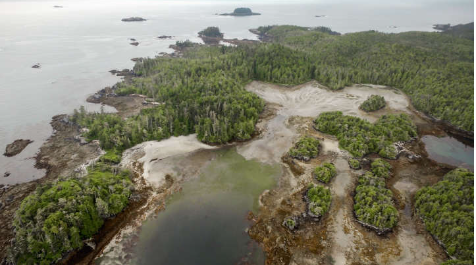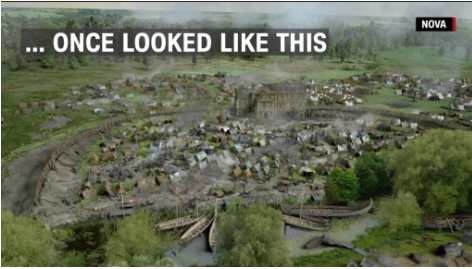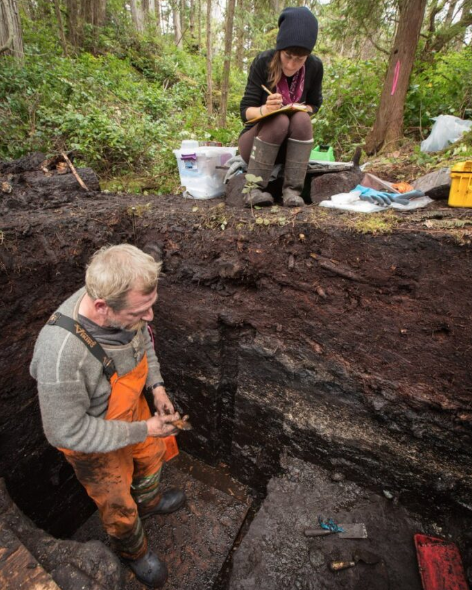The Heiltsuk people, who live on the western coast of British Columbia, tell stories from their oral history of how, during the ice period, the area surrounding Triquet Island was open ground.
Heiltsuk Nation member William Housty explains, “People flocked there for survival because everywhere else was being covered by ice, and all of the ocean was freezing and all of the food resources were dwindling.”

The tangible proof was discovered late last year by archaeologists excavating a Heiltsuk settlement on Triquet Island: a few charcoal flakes from a long-gone hearth.
The town site, which has been abandoned since a smallpox outbreak in the 1800s, may have been inhabited as long as 14,000 years ago, according to analysis of the carbon fragments. This makes it one of the oldest settlements in North America and three times older than the pyramids at Giza.
“This suggests that people have been here for tens of thousands of years,” explains Alisha Gauvreau, a scholar at the Hakai Institute and a PhD candidate at the University of Victoria, who has been working at the Triquet Island site. “There are several sites that date to around the same time as the very early date that we obtained for Triquet Island.”
However, how did Triquet Island manage to stay undiscovered even during the ice age? Sea level hinge, according to Gauvreau, is the reason why sea levels in the region have been steady over time.
She continues, “so the rest of the landmass was covered in ice.” “We experienced some significant changes in sea levels throughout the coast as those ice sheets began to recede, so further north and south there was a difference of 150 to 200 meters, but here it stayed exactly the same.”

According to Gauvreau, the outcome allowed people to visit Triquet Island again and time again. Furthermore, she notes that although there is evidence of ancient habitation at neighboring sites as well, humans “were definitely sticking around Triquet Island longer than anywhere else.” She explains that in addition to finding pieces of charcoal at the site, archaeologists have also discovered items like as hand drills for starting fires, fishhook shards, obsidian blades, and atlatls and spear throwers.
“And I could go on, but basically, from the parent material that was available at the time, all of these things, along with the fallen assemblage, tell us that the earliest people were making relatively simple stone tools at first, perhaps expediently,” adds Gauvreau.
According to her, the location also suggests that these prehistoric humans used boats to collect shellfish and hunt marine creatures. Subsequently, people traveled large distances or engaged in trade to acquire nonlocal materials such as graphite, greenstone, and obsidian for tools.
The discovery supports a theory known as the “Kelp Highway Hypothesis” among anthropologists and archaeologists, which postulates that the earliest inhabitants of North America traveled down the coast in boats in order to avoid the region’s glacial terrain.
According to Gauvreau, “it definitely adds evidence to the fact that people were able to travel by boat in that coastal area.”

Furthermore, the improved archaeological record offers fresh information to the Heiltsuk Nation, who have collaborated with the archaeologists for years to identify locations such as Triquet Island and exchange knowledge.
The country often holds negotiations with the Canadian government about issues of natural resource management and territory governance, some of which are predicated on the community’s history of long-term habitation of the region.
Thus, it’s like me giving you a tale when we’re at the table discussing our oral history, according to Housty. “And you have to take my word for it without checking the evidence.”
But now, he says, the Heiltsuk have fresh leverage at the bargaining table because the archeological and oral history “dovetailing together, telling a really powerful tale.”
That is going to be incredibly important. This will undoubtedly offer us an advantage in negotiations, he asserts.
